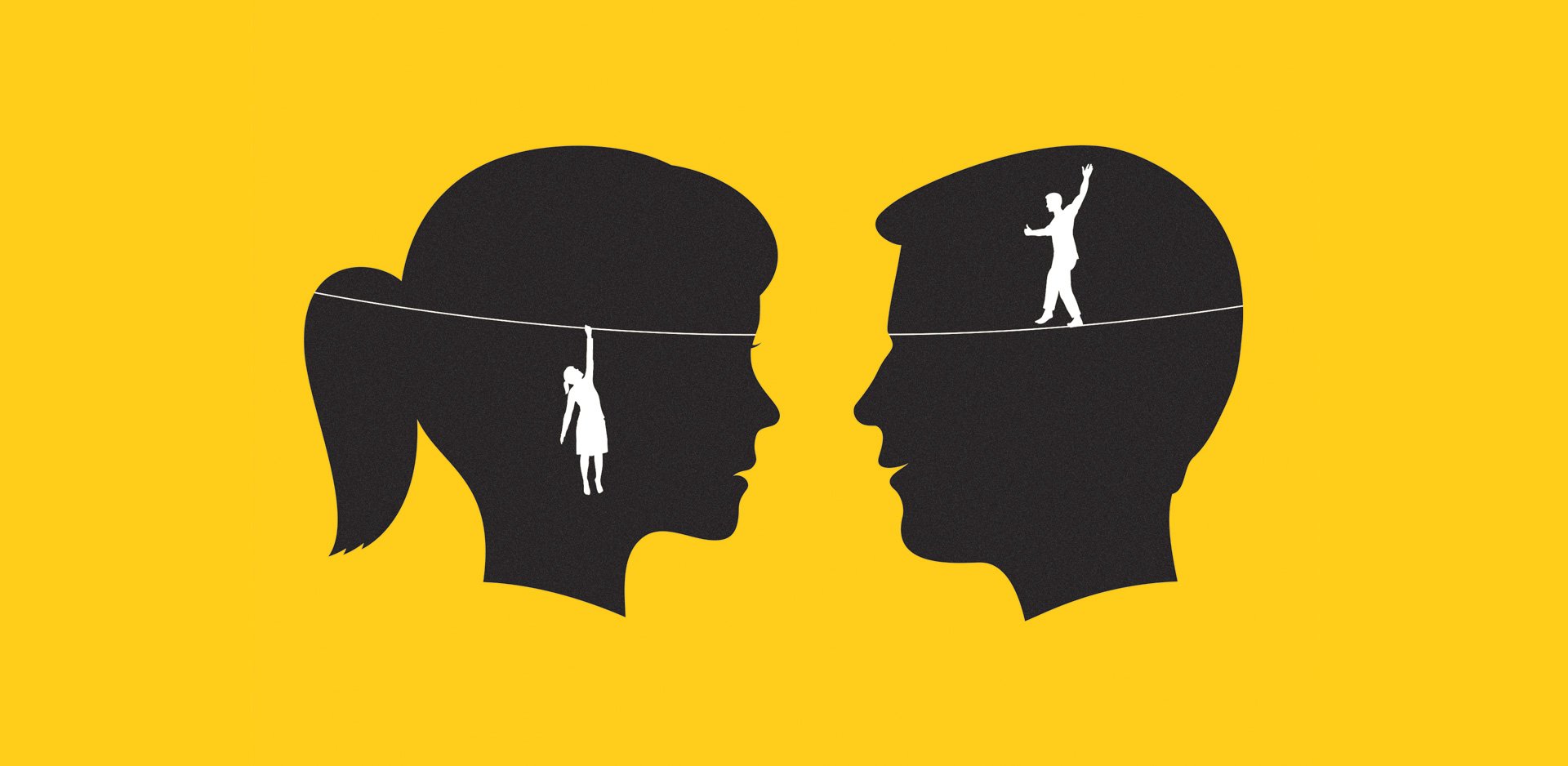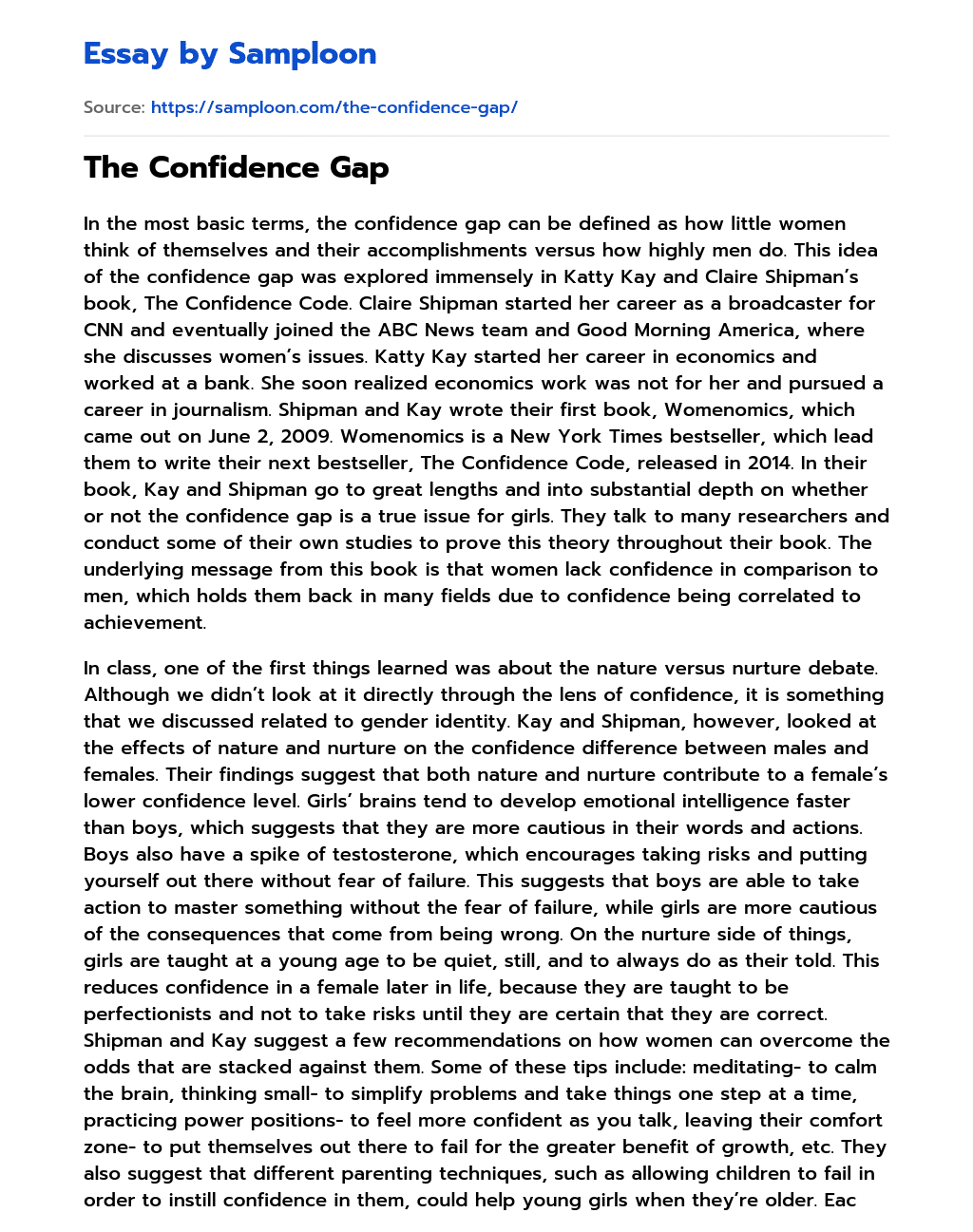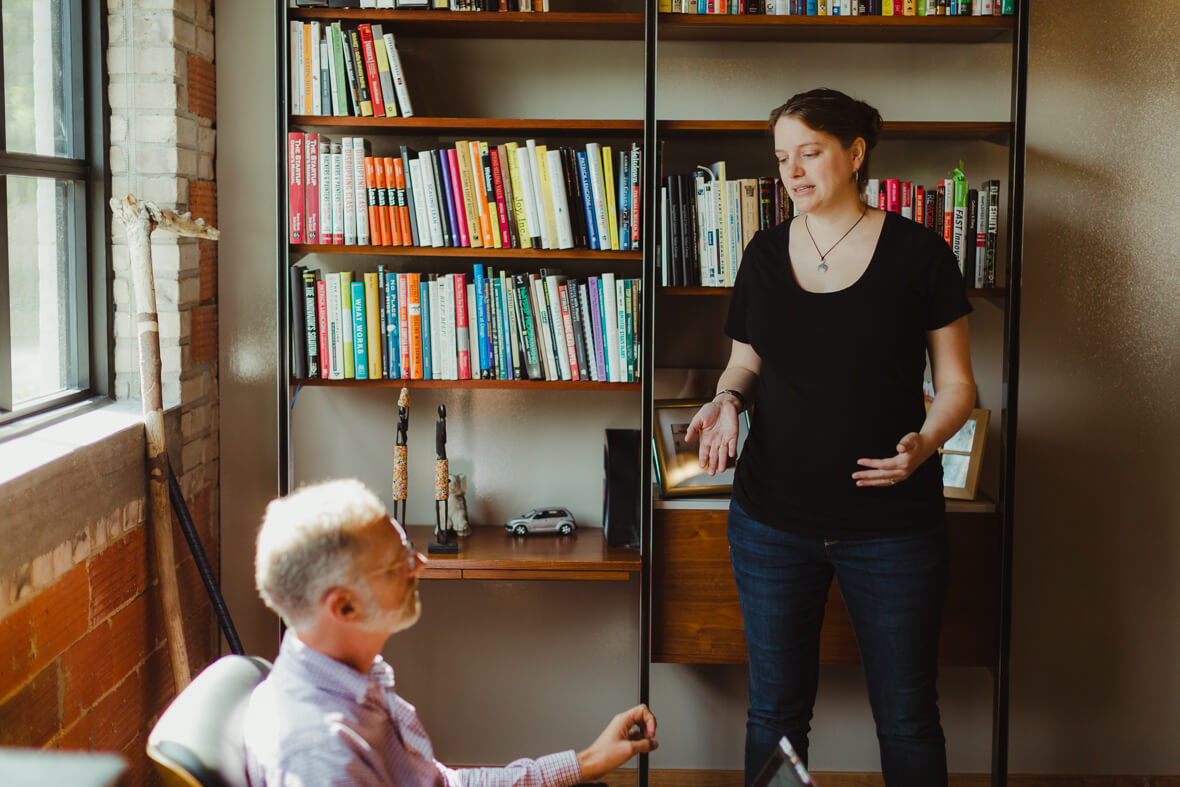The Confidence Gap - Bridging Self-Belief
Feeling good about what you can do, and truly believing in your own capabilities, is a wonderful thing, isn't it? That deep sense of knowing you have what it takes to face what comes your way, that's what many people call confidence. It’s a quiet strength that helps you move forward, whether you are learning something new or simply going about your daily tasks. This inner assurance allows you to trust yourself and your choices.
Yet, for many, that feeling of solid self-belief can feel a bit out of reach, almost like there’s a space between where they are and where they wish to be. This is what some folks call "the confidence gap." It is not about a lack of skill or talent, but more about how someone sees their own abilities and whether they truly believe in them. It often shows up as a hesitation to speak up, to try something new, or to step into a bigger role, even when someone has all the right qualifications, you know?
This article will explore what this gap is all about, why it might show up for people, and some ways to start closing it. We will look at what might hold us back from feeling truly confident and, very importantly, what we can do to change that. It is really about finding that inner strength and letting it shine through, as a matter of fact.
Table of Contents
- What is True Confidence?
- Understanding The Confidence Gap
- How Does The Confidence Gap Show Up?
- Can We Learn to Close The Confidence Gap?
- Letting Go of Unhelpful Thoughts and The Confidence Gap
- Accepting Life As It Is and The Confidence Gap
- Taking Steps Forward Despite The Confidence Gap
What is True Confidence?
Confidence, at its heart, is a belief in yourself. It means trusting that you possess what is needed to handle situations, to learn new things, and to grow. It is a feeling of certainty about your own capabilities, a quiet conviction that you are up to the task. This belief is not about being perfect or knowing everything, but rather about having a good sense of your own worth and what you can bring to the table. For example, when someone says they have great confidence in a person, they mean they have strong faith in that person's ability to do something well. It is a feeling of reliance, a sense of trust that things will work out, you know?
This feeling of self-assurance can be quite steady. It helps you keep going even when things get a bit tough. It is about knowing that even if you make a mistake, you can learn from it and move on. It is not about always succeeding, but about believing in your ability to try, to adapt, and to pick yourself up. So, it is a very personal kind of belief, one that comes from within and helps you face the outside world with a calm spirit.
Understanding The Confidence Gap
The phrase "the confidence gap" points to a situation where people, often those who are quite capable, do not feel as sure of themselves as their skills might suggest. It is about the space between what someone can actually do and what they *think* they can do. This can show up as a hesitation to speak up in a meeting, to ask for a raise, or to apply for a promotion, even when the person is clearly qualified. It is a psychological barrier that can make it harder for someone to show their true abilities and feel good about their contributions. Basically, it can hold people back from genuinely feeling sure of themselves.
Where Does The Confidence Gap Come From?
The idea of "the confidence gap" is something that many people have thought about. Some writings, like those from Russ Harris, talk about how it gets in the way of true self-belief. It seems that this gap does not come from any real lack in a person's natural talents or skills. Instead, it often grows from how we are raised, the things we learn from our surroundings, and the expectations put on us by the wider world. This includes what society expects from us, the general way things are done in our culture, and even the subtle unfairness people might face in their places of work. These outside influences can really shape how someone feels about their own capabilities, as a matter of fact.
Books like "The Confidence Code," written by Katty Kay and Claire Shipman, have explored this topic, particularly for women. They look at how these outside forces can affect how sure women feel about themselves and offer ways to deal with it. So, it is not about fixing something wrong with individuals, but about understanding the bigger picture that shapes our feelings of self-assurance. It is about seeing that these feelings are often rooted in something much larger than just one person's experience, in a way.
How Does The Confidence Gap Show Up?
This lack of inner certainty can show itself in many ways in everyday life. Someone might not speak up even when they have a good idea to share. They might hold back from trying something new, fearing they will not do well. You might see it when someone hesitates to put themselves forward for a new opportunity, even if they have the skills needed. For instance, if someone says, "I lack confidence in my ability to speak English," they are expressing this very thing. They might know the words and the grammar, but the belief in their own speaking ability just isn't there. This can make them shy away from conversations or practice, which then, in turn, keeps that feeling of not being sure about themselves going. It is a bit of a cycle, isn't it?
It can also appear as a general feeling of not being good enough, even when evidence suggests otherwise. Someone might get praise for their work, but still feel like they just got lucky, or that they are not as capable as others think. This feeling can be quite strong and can make it harder to accept compliments or to celebrate successes. Basically, it is about that inner voice that sometimes tells us we are not quite ready or not quite good enough, even when it is not true. That, is that, a very common experience for many people.
Can We Learn to Close The Confidence Gap?
The good news is that this feeling of not being quite sure about yourself is not a fixed thing. It is something that can be worked on and changed. The ideas presented in some writings suggest that we can learn to build more inner certainty. This often involves a few key things: letting go of thoughts that do not help us, accepting life as it comes with all its ups and downs, and taking small, steady steps forward. It is about changing how we think about ourselves and how we react to the world around us. This process is less about becoming a different person and more about uncovering the self-belief that is already there, just perhaps hidden a little. So, it is truly a process of discovery, you know?
It means being kind to yourself through the process and understanding that it is a journey, not a quick fix. There will be good days and days where it feels a bit harder, but the overall movement is forward. It is about practicing new ways of thinking and acting until they start to feel more natural. This takes a little patience and a willingness to be open to new ways of seeing things. It is quite possible for anyone to make these changes, actually.
Strategies for Closing The Confidence Gap
To help bridge "the confidence gap," there are some practical things people can do. One important strategy is to really pay attention to your thoughts and learn to let go of the ones that are not helpful. This means noticing when your mind starts telling you things that make you feel less sure of yourself and gently guiding your thoughts in a different direction. It is not about ignoring difficulties, but about choosing how you respond to them. Another key strategy is to accept life for what it is, with all its good moments and its challenging ones. This means understanding that not everything will go perfectly, and that is okay. This approach can make a big difference in how you feel about yourself, basically.
Also, taking action, even small steps, is very important. Sometimes, the best way to feel more sure of yourself is to simply do something, even if you feel a little unsure at first. This could be speaking up in a meeting, trying a new hobby, or simply starting a task you have been putting off. Each small step helps build a bit more self-belief. These actions show you that you are capable, even when you do not feel completely ready. It is a gradual process, but one that can lead to significant changes in how you experience the world, in some respects.
Letting Go of Unhelpful Thoughts and The Confidence Gap
A big part of dealing with "the confidence gap" involves learning to manage the thoughts that do not serve you well. Our minds can sometimes be full of ideas that make us doubt ourselves, criticize our efforts, or predict bad outcomes. These thoughts can feel very real and can make us feel less capable. However, it is possible to learn to observe these thoughts without getting caught up in them. This means noticing them as they come and go, like clouds passing in the sky, rather than treating them as absolute truths about yourself. This practice can create a little space between you and those thoughts, giving you more freedom to choose how you react. It is a very helpful skill to develop, really.
Instead of fighting these thoughts or trying to push them away, the idea is to simply acknowledge them and then let them pass. This takes practice, but over time, it can lessen their hold on you. When you do not give these unhelpful thoughts so much attention, they tend to lose their strength. This then makes room for more supportive and realistic ways of thinking about yourself and your abilities. It is about cultivating a kinder, more encouraging inner voice, you know?
Accepting Life As It Is and The Confidence Gap
Another important piece of building inner certainty, especially when facing "the confidence gap," is to embrace life for what it is, with all its twists and turns. Life is full of good times and challenging moments, successes and setbacks. If we only feel good about ourselves when everything is going perfectly, our self-belief will be very fragile. Accepting that life naturally includes both ups and downs means you do not have to be perfect all the time to feel okay about yourself. It means understanding that mistakes happen, plans change, and sometimes things do not work out as we hoped, and that is just part of being human. This outlook can take a lot of pressure off and allow for a more stable sense of self-worth. It is a pretty freeing way to look at things, honestly.
This acceptance also means being okay with your own feelings, even the uncomfortable ones. Feeling nervous, unsure, or even a little scared before trying something new is normal. Accepting these feelings, rather than trying to push them away or judge yourself for having them, can actually make them less intense. When you allow yourself to feel what you feel, you create a stronger foundation for self-belief, one that is not dependent on everything being perfect. This way of being can help you move forward with a bit more ease, even when things are not ideal, as a matter of fact.
Taking Steps Forward Despite The Confidence Gap
Ultimately, to truly build more self-belief and address "the confidence gap," it is important to take action. This does not mean waiting until you feel completely sure of yourself before doing anything. In fact, it is often by taking steps, even small ones, that self-belief begins to grow. When you act, you gather new experiences, learn what works and what does not, and prove to yourself that you can handle things. This might involve doing something that makes you feel a little uncomfortable at first, like volunteering to lead a small part of a project, or starting a conversation with someone new. Each time you do something that stretches you a bit, you gather evidence of your own capabilities. So, it is really about moving, rather than waiting, you know?
These actions do not have to be grand gestures. Simple, consistent steps can build momentum over time. For example, if you feel unsure about your English speaking ability, as mentioned earlier, simply speaking a few sentences each day, even to yourself, can be a start. Or, if you are unsure about a new skill, trying just one small part of it. The key is to start, and then to keep going, learning from each attempt. This process of doing, learning, and adapting is how true self-belief gets stronger. It is a very practical way to build up your inner strength, actually.
- Dehydrator For Mushrooms
- Who Is Playing Rapunzel In The Live Action Movie
- Dream Of Bleeding While Pregnant
- Shenanigans Kitchen And Cocktails
- Chappell Roan Beyonce

The Confidence Gap - League of Women in Government

≫ The Confidence Gap Free Essay Sample on Samploon.com

Unpacking the Confidence Code, Part 2 – The Men/Women Confidence Gap